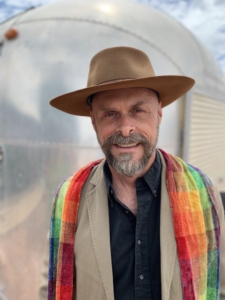Listen for a Vision
Reflection: Listen for a Vision Rev. Ron Phares MVUU 9.9.18
Welcome: We’re doing something a little bit different today. Usually I come up with a title and blurb based on the monthly and rotational themes and a congregational diagnosis. This week, instead, I asked Kimberly to supply me with hymns based not on my reflection title and blurb, but on her take on the monthly and rotating themes alone. For those who do not know, our liturgical calendar, so to speak, is based on the intersection between monthly themes – a unique theme to every month – and our rotating themes of spirit, justice, and community. So September is Spirit and Vision.
Kimberly supplied three hymns and I based my reflection on them. You can find the hymns for each Sunday on the insert, by the way. So we just sang “Be Thou My Vision” for our opening hymn. We’ll sing “Voice Still and Small” for the pastoral hymn and “Sanctuary” for our close. I’ll reflect with you on what they are singing to me. You can do the same for yourself. Through hymns, we’ll move through history, theology, and hope. We’ll bind ourselves together and bind our hearts to our best selves by the music we make and the wisdom we receive.
I’ll invite you into this space with a single note.
Reflection: I love Sun Devil football. Its relevant. How is it relevant? I’ll tell you why very soon. You’ll have to stay curious for a few moments.
And that’s good. Curiosity is the key to our faith. So it’s a good place to start and stay. And start there we do. To wit: I asked Kimberly, our Music Director, to give me 3 hymns upon which to base a reflection. Of course, as a genre, hymns are meant to be sung and heard. It may seem overly obvious, but to hear the message of a hymn, we must listen!
And yet this month’s theme is VISION. So, quite unwittingly I gave Kimberly the assignment of conveying sight (vision) through sound (hymns). And that… is curious! That is also curious!
Sight via sound. Our practice today is synesthetic. Synesthesia is the confusion of senses… or the expansion of them… the connection and interplay and overlay. It is when you see numbers as colors or taste sounds. Synesthesia. Today we practice synesthesia.
But how do we practice synesthesia? How do I, in words, reflect on songs about seeing? Where do we start? The answer here is the same as it always is to almost any question. It should be obvious.
You start with football. Sun Devil football.
Hey, I get a lot out of watching football! There’s the entertainment, the adrenaline, the family time, the opportunity to let my emotions have a life. And occasionally, there are nuggets of wisdom.
Here’s one! There’s no such thing as luck, only being prepared for opportunity. Right there is a fair summation of my take on ritual and on our Sunday practice in general. Speaking of which, another football aphorism. You play how you practice. If you are not the you you want to be in this congregation, there’s little chance you will be the you you want to be outside of it. That’s why we practice, right?
Another bit of wisdom, this from one time NFL head coach turned ESPN analyst turned head football coach of Arizona’s most prestigious university Herm Edward’s. He once said, “You play to win the game.” I’m not sure what the theological applications of that one are yet.
But here’s a Hermism that helped me into today’s reflection. As the Devils were gearing up for the season and competing for starting spots at various positions on the team, Herm shared his player evaluation technique. Herm says: “I listen with my eyes.”
I listen with my eyes?! Synesthesia again!
“I listen with my eyes.”
What he’s saying… or at least what I am hearing… is that there are many different ways of listening. You can listen with your eyes. You can listen with your body.
I remember – and maybe some of you have done this – going to concerts and putting myself right in front of the speakers – the stacks of speakers – so that I could feel the music with my full body. You ever do that? That’ll teach that there are parts of you that can hear that you can’t see. We can also listen to history. You can listen to a memory that makes no sound in the present. You can listen with your mind. With your heart. With your soul. Perhaps you can even hear
through or along with the mothersoul, that receptive aspect of the collective consciousness from which we delineate and to which we happily return.
What have we heard today? What have we sung? We started with hymn #20 Be Thou My Vision. The lyrics are from a longer poem written in Ireland sometime between the 8th and 11th century. Sometime between now and then it was set to the traditional tune of Slane, the same tune as another hymn in our and other hymnals, Wake Now My Senses. Be Thou My Vision is not only a poem, it’s a prayer, an a specific kind of prayer at that. It’s a lorica, a prayer for protection.
Why protection? The poem was composed during time of clan warfare. In its longer and complete version, it envisions God as a chieftain protector. Our hymnal leaves this out. If we have to do god, we do not want “him” as a warrior king.
That we are able to make this decision speaks to two things: one, that we have the privilege of peace. And two, that given this privilege, we would chose it again and again. Our choice of lyric locates us both historically and theologically and challenges us to wonder whether our current theology of peace is as much a product of our historical moment as theirs was.
Whatever the theology, Be Thou My Vision is decidedly theistic. And whatever it is you think of God, the quality of the god this hymn is imploring is something abiding, that which abides through, in, and beyond all transient treasures and trials, a universal constant… or if not a constant then a universal integrity from which we can draw wisdom, strength, and, in its ever presence, even companionship.
We ask that it be by that integrity that we view the world so it will be with clarity of soul that we conduct ourselves.
Our pastoral hymn was composed much more near in time and theology. Hymn #391 Voice Still and Small was written in 1940 by a Unitarian minister. Oddly enough – or perhaps not so odd at all – it references the Bible. The phrase “still, small voice,” references the Old Testament book of Kings chapter 19 verse 11.
There we are met with Elijah, a prophet on the run. He’s been working his butt off in the name of his god and against the followers of a competing diety. But despite all his work, he is still a hunted man and so he hides up in a cave.
While he’s hiding, he hears the word of God. God asks, “Elijah, what are you doing here?” At which point Elijah complains to God that he’s kind of getting a raw deal. And that’s where we pick up the action in verse 11.
11 He (God) said, “Go out and stand on the mountain before the Lord, for the Lord is about to pass by.”
As an aside, yes, this is god talking about himself in the third person. And, it doesn’t make sense to me. If you and I are in a conversation and then you say, “Go outside because I’m going to pass by,” I’m going to look at you like you just ate a Tide packet. Like… we’re talking now aren’t we? Anyway, Eli goes outside…
Now there was a great wind, so strong that it was splitting mountains and breaking rocks in pieces before the Lord, but the Lord was not in the wind; and after the wind an earthquake, but the Lord was not in the earthquake; 12 and after the earthquake a fire, but the Lord was not in the fire; and after the fire a sound of sheer silence.
It is this sound of silence that the King James Version of the Bible translates (and when it comes to the King James Version, I use the term “translates” with great liberality)… what the King James Version calls a still, small voice, the more accurately translated New Revised Standard edition calls “sheer silence.” This is an interesting contrast of translations: god manifesting as a still small voice verses god manifesting as sheer silence.
But what is sheer silence anyway? God as absence? One thing both translations share is the notion that god, the ultimate, the great creative/sustaining/destructive energy, the reality beyond our perception of consequence and time, THE moment containing all moments, is described not as a cacophony, not as power, not as mass, but as something far more intimate, something quiet.
Another thing both translations share is that God is presented as an audible metaphor, centering god in sound rather than sight. But whereas King James calls it a still small voice, scholars translate it as an utter lack of sound.
To recenter onto the audial and then to discount the audial… that’s a curious device.
13 When Elijah heard it, (or didn’t hear anything… didn’t hear it? Heard not it?) he wrapped his face in his mantle and went out and stood at the entrance of the cave. (That’s kind of a cool image. I see it as purple dusk – that interval of perpetual aftermath and coming rest. A haggard middle eastern man hangs from his rags, recently released from
the grip of epiphany, shaken but not shaking.) Then there came a voice to him that said, “What are you doing here, Elijah?”
That’s funny! Right where he started.
So here’s what I’m taking from this – because after this god tells Eli to go out and do some really weird and violent stuff and all that amazement and wonder and on-point wisdom that the writers had conjured with the sound of silence is squandered on some tribal Baal-bashing. But the nugget is there. And here’s what it is as far as I can see… or hear… or not hear…
God is not what you think God is. Or perhaps god is that great generative eilence and emtiness in the midst of all things. But whatever God is, they never stop asking you: What are you doing here? For silence is generative. It calls into being. Now what will you do?
So we go back to the hymn. Sheer silence, “deep inside us all, I hear you call, singing.” I hear the silence singing.
And in that silence, “Now what will you do?” In storm and rain and sorrow and pain, still we remain, singing… so what will you do now?…
That emptiness, that befuddlement that is god, queerly calms our fears, quenches tears, through all the years singing… singing, “So what? Come on… Come on… bring it.”
Action from emptiness. It’s very zen.
Sanctuary
By who? Christian spiritual. Original lyrics Lord, prepare me to be a sanctuary Pure and holy, tried and true With thanksgiving, I’ll be a living Sanctuary for You
Life is an interpretive event. You are your attention. Make connections between traditions and experience. Listen. Listen with your eyes! Listen with your mind. Listen with your whole being. Here’s what we have heard.
If we place our faith in a universal, spiritual integrity we may be at peace in the wake of all manner of tumult and therein and within hear the song in silence that ask us… what are we
doing? And by the power of that integrity and curiosity, we may build of ourselves a holy place of safety and courage and connection and care.
Go Devils.



